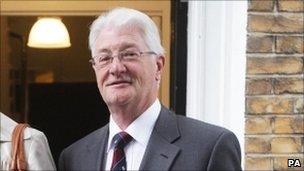Christopher Tappin loses Iran missile extradition bid
- Published

Mr Tappin faces up to 35 years in jail if convicted in a US court
A retired businessman has failed in his latest bid to prevent his extradition to the US on charges of conspiring to sell batteries for Iranian missiles.
Lawyers for Christopher Tappin wanted to take his case to the Supreme Court.
But the application was rejected by High Court judges who said the case did not raise legal issues of general importance suitable for consideration.
Mr Tappin, 64, from Orpington, south-east London, says he was the victim of an FBI "sting".
Mr Tappin is wanted in El Paso, Texas, on a charge of conspiring to export defence articles without licence or approval and aiding and abetting the attempted export of defence articles without the required licence.
Car batteries
The decision against him means that Mr Tappin has exhausted all legal remedies in the UK
He is also accused of intentionally and unlawfully attempting to conduct financial transactions from the outside to a place inside the US, with the intent to promote the carrying on of a specified unlawful activity.
If convicted, he could face up to 35 years in prison.
Mr Tappin, the former director of Surrey-based Brooklands International Freight Services, said he believed he was exporting batteries for the car industry in the Netherlands.
Earlier this month he lost his High Court battle against the extradition, with his lawyers condemning the "one-sided" UK-US extradition treaty.
Deceive and ensnare
He was "thoroughly disappointed" with the High Court judgement, he said.
After that judgement he said: "I was relying on the British justice system to protect me from false allegations made by a maverick government agency clearly operating outside the law in the US."
Mr Tappin had been challenging a decision made in February last year by district judge John Zani at City of Westminster Magistrates' Court that extradition could go ahead.
Edward Fitzgerald QC, appearing for Mr Tappin, told the High Court at a hearing in December that his client was the victim of an abuse of power.
Mr Fitzgerald said FBI agents pretending to belong to a fictitious export company known as Mercury Global Enterprises set out to "dupe, deceive and ensnare" unsuspecting businessmen.
In June last year, the Â鶹ԼÅÄ Office said it would not refuse Mr Tappin's extradition on human rights grounds.
- Published13 January 2012
- Published30 September 2011
- Published22 June 2011
- Published20 June 2011
- Published11 February 2011
- Published2 September 2010
- Published16 August 2010